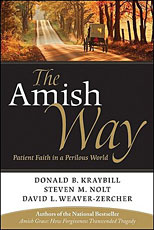Donald Kraybill is senior fellow at the Young Center of Elizabethtown College, Steven Nolt is professor of history at Goshen College, and David Weaver-Zercher is professor of American religious history at Messiah College. They are the co-authors of the bestselling book Amish Grace — one of our choices for The Most Spiritually Literate Books of 2007. In this follow-up, they use interviews with the Amish people, Amish publications, and their own firsthand experiences in Amish communities to explain their faith and their spiritual practices. There are some 1,800 individual congregations and 40 subgroups of Amish, and they have no governing body. Of their spirituality, the co-authors note:
"The spirituality of Amish people is not something that stands on its own, apart from their daily lives as mothers and fathers, farmers and carpenters, ministers and laypeople. Rather, their spirituality gives them a framework for making decisions about marriage, family, work, and play — indeed, a framework that helps them face all the pleasures and uncertainties that human life entails."
Whereas most of us are propelled by "hurry sickness," the Amish avoid rushing around or making quick fixes to problems. Resistant to the ideal of changing things, they patiently plod along in the tried and true traditions of their path. They are also countercultural in their aversion to conforming to the ways of the world. They see themselves as constantly choosing obedience to God and the higher road that leads to Heaven. At the same time, the Amish believe in free-market capitalism, political democracy, and conservative family values.
In a section of the book called "The Amish Way of Community," Kraybill, Nolt, and Weaver-Zercher explore the beliefs and practices which form the foundation of communal life: surrender of self-will, joining the church, worship and prayer, mutual aid, and church discipline. There is a great deal of security among believers whose lives are shaped by doctrine, humility, and the communal perks that kick in when one gets sick or loses a barn in a fire. The trade-off is the loss of privacy and personal choice. Community is also sustained by the practice of shunning, a natural outgrowth of the Amish belief in accountability and church discipline. Rebellious and disobedient men and women are cut off from the Amish community because "shunning is tough love for the wayward."
Our favorite section of the book is "The Amish Way in Everyday Life." Here you will find out the methods parents use to teach silence and patience to their children; the use of singing as an antidote for depression; the purpose of mingling across the generations; the Amish practice of "kicking the problem upstairs" to God; and the many ways this community has found to deal with the heartache that accompanies tragedy and disappointment. In the last chapter, the co-authors tally up the Amish life's benefits (Security, Serenity, Contentment, and Community) and the costs (Giving Up Self-Determination, Limited Options, Lack of Convenience, the Loss of Personal Privacy). And after recounting the lessons learned from the Amish way, Kraybill, Nolt, and Weaver-Zercher conclude: "the Amish way reminds us that the spiritual life is a journey best shared in the company of others."
